
When it comes to sex, everyone has a unique journey. Some people may choose to wait until marriage, while others may lose their virginity in their teenage years. Despite the variety of experiences, the topic of virginity remains shrouded in mystery and taboo. However, statistics can shed some light on this subject and provide insight into the patterns and trends in virginity loss. In this statistical piece, we will explore the average age at which people lose their virginity and the factors that influence this decision.
Here’s what you can find in this report:
- Average age to lose virginity
- Average age for a man
- Average age for women
- By country
- By US state
- By age
- Virginity until marriage
- Virginity pledge
- High School and College
- Which factors influence the decision to lose virginity?
Key Findings
- 17 years and 2 months is the average age to lose your virginity for the world population.
- 17 years is the average age to lose your virginity in the USA.
- 16 years and 9 months are the average age at which men lose their virginity.
- 17 years and 3 months is the average age at which women lose their virginity.
- Utah is the US state with the highest rate of virgins (20%)
- Vermont is the US state with the lowest rate of virgins (8.2%)
- 1 out of 30 women are virgins until marriage.
- 1 in 6 American adolescents has made a virginity pledge.
- 40.8% of high school and college students have had sex.
- Factors influencing the decision to lose virginity: Biological factors, Social factors, and Personal factors.
Average age to lose virginity
Throughout the years the average age to lose your virginity is decreasing; in other words; people are becoming younger and younger when they have their first sexual experience. Our research points out that this is due to primarily two macro trends; 1) more sexual freedom (exposure to more sexually explicit material) and 2) better sex education.
- 17 years and 2 months is the average age to lose your virginity for the world population.
- 17 years is the average age to lose your virginity in the USA.
- 1 out of 10 has their first sexual experience with a person of the same gender.
- For a household with two parents the average age to lose your virginity is 17 years and 6 months. For a household without two parents, it is 16 years old.
- 2 out of 100 that grow up with two parents lose their virginity when they are 12 years old or younger. It’s 6 out of 100 if the child does not have two parents in the household.
- Smokers or non-smokers do not have any correlation with virginity loss.
- A person smoking >2 cigarettes per day does on average lose virginity at the age of 15 years and 6 months, while people smoking less than 2 cigarettes a day is 17 years and 2 months.
- The average age for losing virginity for people who are 15 years old now is 13 years old, and for people who are 44 years old, it’s 18 years old.
- 73.9% used contraception during first sex, and the rest 26.1% did not.
- 15% had 2 or more sex partners the same year as they lost their virginity.
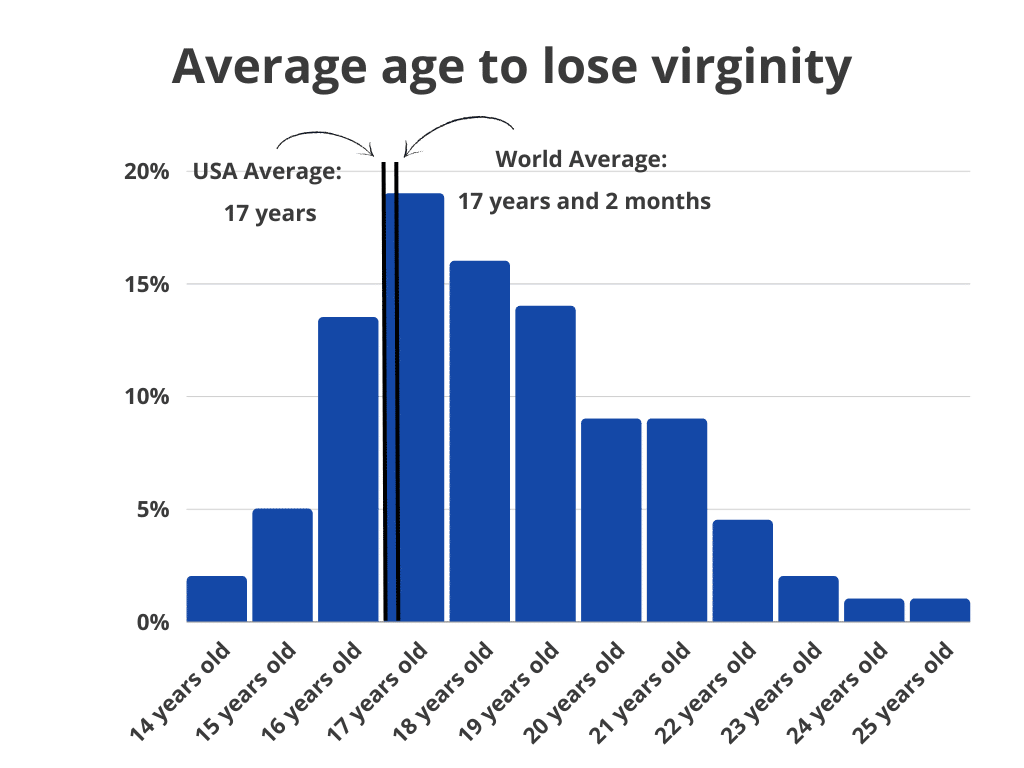
Average age for a man
The average age for men losing their virginity can be a topic of interest and curiosity for many people. While the age at which men become sexually active can vary widely depending on cultural, social, and individual factors, studies have attempted to determine the average age. But no one has ever gotten so close as we have. Keep reading to find the average age at which men lose their virginity:
- 16 years and 9 months are the average age at which men lose their virginity.
- 14.5% of males between the age of 20-24 are virgins.
- Men’s first sex happens typically with women 6-8 months older than them.
- When men move from their parent’s house (approx after the age of 19) more males are virgins than females.
- 93% of males’ first sexual activity was expected/wanted.
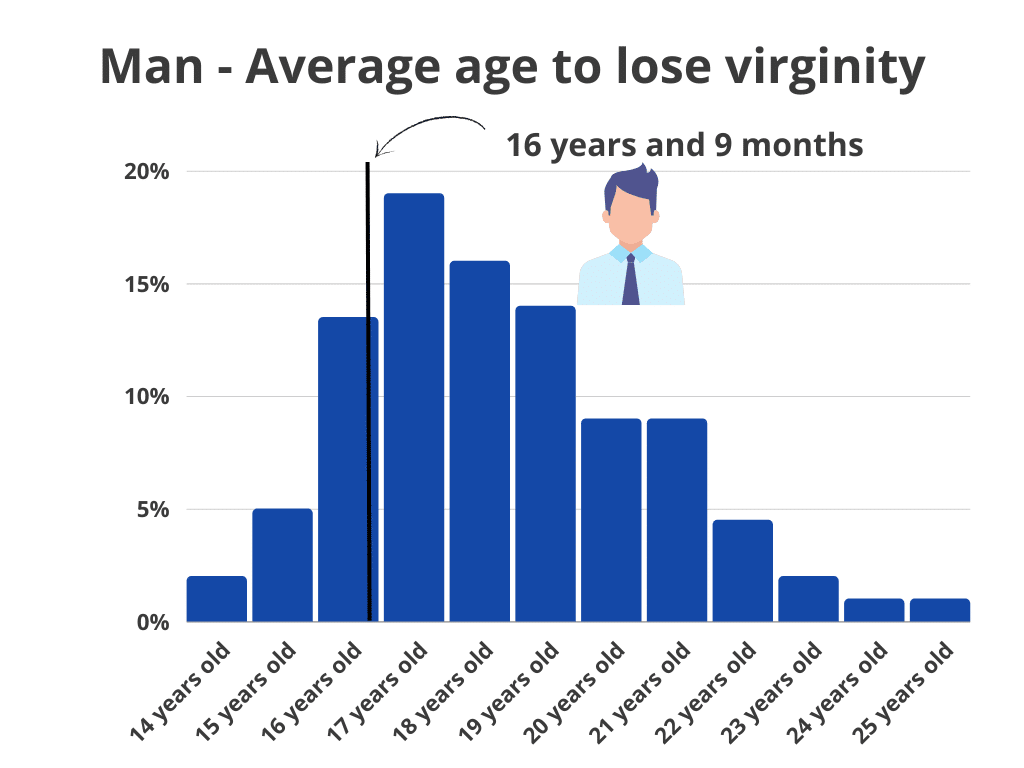
Average age for women
Female virginity, often defined as a woman’s state of never having engaged in sexual intercourse, has been a topic of cultural and social significance for centuries. In many cultures and religions, female virginity is viewed as a symbol of purity, morality, and marital suitability.
Here are the key findings from our study:
- 17 years and 3 months is the average age at which women lose their virginity.
- 12.5% of females between the age of 20-24 are virgins and only 5% between the age of 15-19.
- Women’s first sexual partner is typically men who are 1-2 years older than them.
- More women are virgins in the range of 15-18 years old compared to men.
- 94% of females’ first sexual activity was expected/wanted.
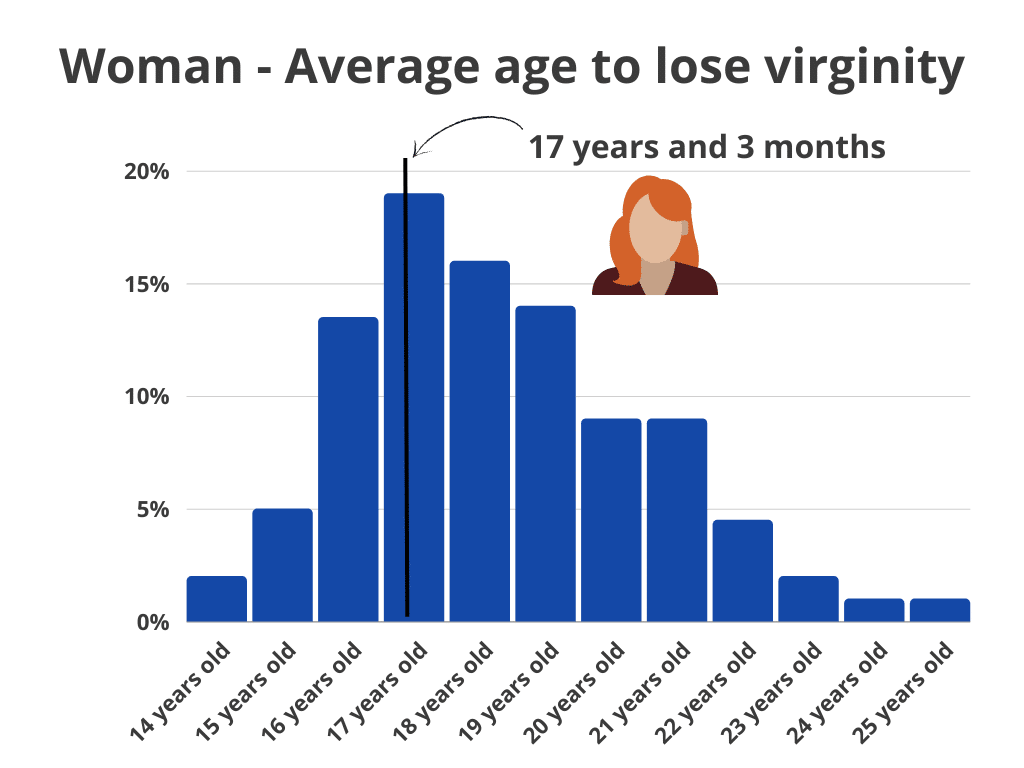
By country
We’ve analyzed the average age for when people in different countries have their first sexual activity. As it appears below countries that are less educated about sex do have a lower average age; they have their debut earlier than wealthier countries. Countries that are influenced a lot by religion and/or the State do have a higher average age than others. This is primarily because some religions have strict rules for such activities, and some states have created a culture for it (e.g. by having strict alcohol rules).
| Country | Male (age) | Female (age) | Average (age) |
|---|---|---|---|
| United States (US) | 16 yrs. 9 mos. | 17 yrs. 3 mos. | 17 yrs. |
| United Kingdom (UK) | 16 yrs. 5 mos. | 17 yrs. 6 mos. | 17 yrs. 1 mos. |
| Australia | 17 yrs. 5 mos. | 17 yrs. 5 mos. | 17 yrs. 5 mos. |
| France | 17 yrs. 5 mos. | 17 yrs. 5 mos. | 17 yrs. 5 mos. |
| Italy | 17 yrs. 7 mos. | 18 yrs. 2 mos. | 17 years 9 mos. |
| Norway | 18 yrs. 8 mos. | 17 yrs. 1 mos. | 17 years 9 mos. |
| Switzerland | 18 yrs. 7 mos. | 18 yrs. 5 mos. | 18 years 6 mos. |
| Canada | 17 yrs. 5 mos. | 17 yrs. 1 mos. | 17 yrs. 3 mos. |
| Australia | 16 yrs. 12 mos. | 16 yrs. 12 mos. | 16 yrs. 12 mos. |
| South Africa | 15 yrs. | 15 yrs. 8 mos. | 15 yrs. 4 mos. |
| Malaysia | 18 yrs. 5 mos. | 17 yrs. 5 mos | 18 yrs. |
| Singapore | 18 yrs. 9 mos. | 17 yrs. 7 mos. | 18 yrs. 3 mos. |
| Indonesia | 17 yrs. 10 mos. | 17 yrs. 12 mos. | 17 yrs. 11 mos. |
| Thailand | 16 yrs. 6 mos. | 16 yrs. | 16 yrs. 3 mos. |
| Philippines | 15 yrs. 7 mos. | 16 yrs. 5 mos. | 16 yrs. 1 mos. |
| Ireland | 16 yrs. 3 mos. | 17 yrs | 17 yrs. 7 mos. |
| Pakistan | 20 yrs. | 19 yrs. | 19 yrs. 5 mos. |
| Netherlands | 17 yrs. 2 mos. | 17 yrs. mos. | 17. yrs. 2 mos. |
| South Korea | 20 yrs. 2 mos. | 23 yrs. 4 mos. | 21 yrs. 8 mos. |
| Country missing? Contact us |
By US state
The differences for when you lose your virginity are quite big between the 50 United States.
In Utah, it’s 20%, which is the state with the highest virginity rate, and this is because Utah is the biggest Mormon area. Mormons do have guidelines for sexual intercourse.
The States with the lowest ratio are Vermont, Delaware, and Nevada which all have that in common they have a lot of tourists/traffic/immigrants. For example, Las Vegas in Nevada is known as a “Sin City”.
| State | Average virginity (in %) |
|---|---|
| Utah | 20% |
| South Dakota | 18.2% |
| Idaho | 18.1% |
| Iowa | 17.8% |
| Arkansas | 17.8% |
| Alabama | 17.7% |
| Alaska | 17.5% |
| Arizona | 17.4% |
| Colorado | 17.1% |
| Connecticut | 16.7% |
| Georgia | 16.5% |
| Illinois | 16.5% |
| Indiana | 16.2% |
| Kansas | 16% |
| New York | 15.8% |
| California | 15.7% |
| Florida | 15.7% |
| Kentucky | 15.7% |
| Louisiana | 15.2% |
| Maine | 15.1% |
| Maryland | 14.7% |
| Massachusetts | 14.5% |
| Michigan | 14.3% |
| Minnesota | 14.2% |
| Mississippi | 14.2% |
| Missouri | 14% |
| Nebraska | 13.9% |
| Nevada | 13.8% |
| New Jersey | 13.8% |
| North Carolina | 13.4% |
| North Dakota | 13% |
| Ohio | 12.8% |
| Oklahoma | 12.6% |
| Pennsylvania | 12.6% |
| Rhode Island | 12.5% |
| South Carolina | 12.4% |
| Tennessee | 12.2% |
| Texas | 12% |
| Virginia | 11.6% |
| Washington | 11.4% |
| West Virginia | 11.2% |
| Wisconsin | 11.1% |
| Wyoming | 11.1% |
| Hawaii | 10.6% |
| Nevada | 10.4% |
| New Hampshire | 10.2% |
| Montana | 9.8% |
| Oregon | 9.6% |
| New Mexico | 8.8% |
| Delaware | 8.6% |
| Vermont | 8.2% |
By Age
The below graphs show the development of virginity by age. As it appears lot happens from 15 to 20 years old for both genders. When 15 years old almost 8 out of 10 are virgins, and when they are 20 years old we expect less than 2 out of 10 to be virgins.
A funny observation is that the generation that is 43 years old is what we in statistical terms call an outlier. They have compared to other segments a higher percentage of virgins of similar ages.
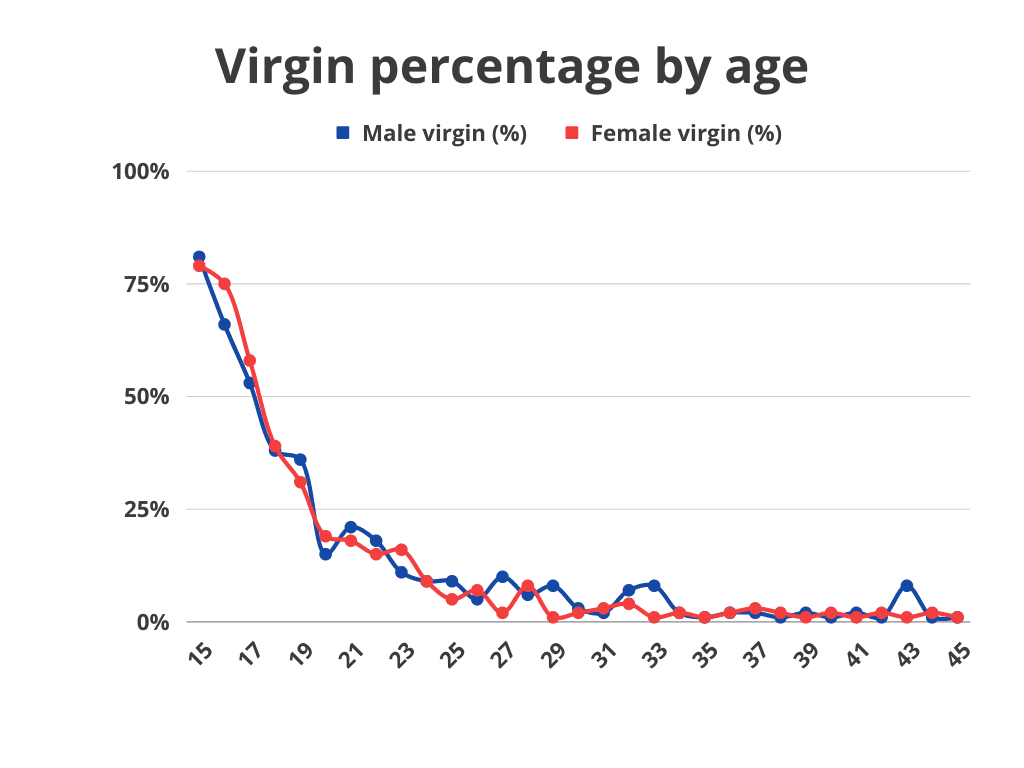
Virginity until marriage
The prevalence of virginity until marriage varies widely depending on the country, culture, and religious beliefs. However, here are some statistics from different regions of the world:
- 3% of people are virgins until marriage. In other words 1 out of 30 women.
- Fewer sex partners correlate with a longer/happier marriage.
- People who wait for sex until marriage go more to church/mosque/etc.
- 90% of Europeans between the ages of 18 and 24 reported having sexual intercourse before marriage.
- The prevalence of premarital sex among young unmarried women in the Middle East is estimated to be between 20% and 50%.
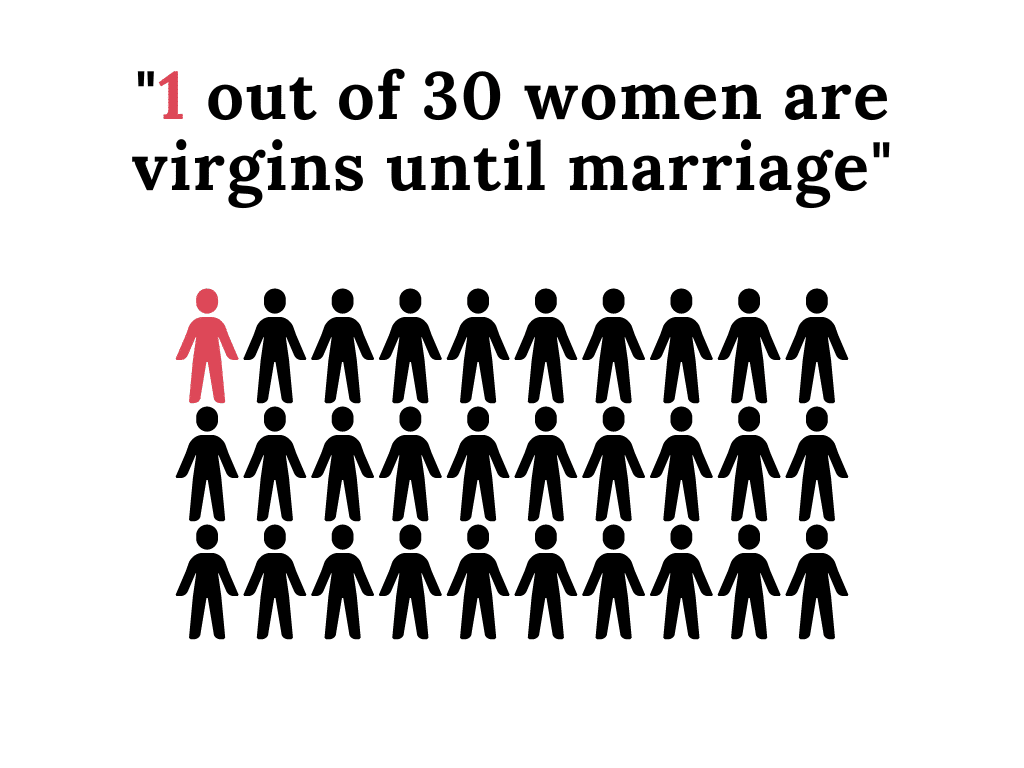
Virginity pledge
Virginity pledges are commitments made by individuals to abstain from sexual activity until marriage. These pledges are often made in religious or conservative communities and are sometimes promoted by abstinence-only sex education programs.
There have been several studies on the effectiveness of virginity pledges. Here are some statistics related to virginity pledges:
- 1 in 6 American adolescents has made a virginity pledge.
- Pledgers were less likely to report having had sexual intercourse than non-pledgers, but they were also less likely to use contraception when they did become sexually active.
- Research shows the virginity pledges only work if you’re religious else it doesn’t.
- Virginity pledges were associated with higher rates of anal and oral sex, possibly due to the perception that these behaviors do not count as “real” sex.
- In 2020 there were around 3 million adolescents that had signed a virginity pledge.
- Females are more likely to be pledge signers and to keep what she/her promised.
- 1 out of 10 teens in the US signs a virginity pledge every year.
- The average age to lose virginity after a virginity pledge is 21 years old. That’s 4 years older than the average.
- 75% of the pledges are sexually active.
High School and College
Here are some statistics related to virginity among high school and college students:
- 40.8% of high school and college students have had sex.
- 15% have had more than 4 sexual partners.
- Only 5 out of 10 students have talked with their parents/guardians about how to say no to sex.
- 78.2% have learned in school how to say no to sex.
- 55% do not use condoms the first time.
Which factors influence the decision to lose virginity?
Several factors can influence an individual’s decision to have their first sexual experience, including biological, social, and personal factors.
- Biological factors such as puberty and hormonal changes can contribute to the onset of sexual desire and the decision to have sex for the first time.
- Social factors, including cultural and religious beliefs, peer pressure, and social norms, can also play a significant role in shaping an individual’s sexual experiences. For example, in some cultures or religions, sex before marriage may be frowned upon, while in other cultures, premarital sex may be accepted and even encouraged. Additionally, peer pressure and social norms can lead individuals to feel pressure to engage in sexual behavior, even if they may not feel ready.
- Personal factors, including individual values, beliefs, and experiences, can also impact an individual’s decision to have their first sexual experience. For instance, an individual’s personal beliefs and values may shape their attitudes towards sex and impact their decision to engage in sexual activity. Similarly, previous experiences, such as childhood trauma or sexual assault, may impact an individual’s decision to have sex for the first time.
Interested in more about virginity?
Then take a look at these:
